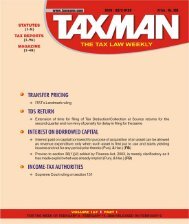CPT V24P7-Art1 (Content).pmd - Taxmann
CPT V24P7-Art1 (Content).pmd - Taxmann
CPT V24P7-Art1 (Content).pmd - Taxmann
You also want an ePaper? Increase the reach of your titles
YUMPU automatically turns print PDFs into web optimized ePapers that Google loves.
Two recent instances of such practices have<br />
been provided in this article.<br />
2. COURT DECISIONS<br />
2.1 Case of Firoz Tin Factory v. Asstt. CIT<br />
2.1.1 Entire demand directed to be paid within 7<br />
days only - In Firoz Tin Factory v. Asstt. CIT<br />
[W.P. No. 765 of 2012, dated 26-3-2012], a<br />
demand of ` 36,56,61,776 was raised and the<br />
assessee was directed to pay the entire demand<br />
within a period of 7 days (curtailing the<br />
prescribed period of 30 days for payment of<br />
demand, without mentioning any cogent reasons<br />
for doing so). On such action of the AO, the<br />
High Court has observed: “there was absolutely<br />
no justification for the AO making an order of<br />
demand within a period of one week from the date<br />
of the assessment order”. Such observations are<br />
indicative of the unreasonable steps resorted<br />
to for the realization of even unmerited demands.<br />
2.1.2 Provisional attachment under section 281B<br />
taken - In this case action by way of provisional<br />
attachment under section 281B has already<br />
been taken, attaching the amount invested by<br />
the assessee in mutual funds, which was almost<br />
equal to the demand raised.<br />
2.1.3 The Bombay High Court orders no coercive<br />
steps to be taken - Even on these facts the<br />
assessees’ request for stay of demand till the<br />
disposal of appeal by the CIT(A) was rejected.<br />
Hence, the assessee had to file a writ petition<br />
before the Bombay High Court for relief. The<br />
HC passed an order that no coercive steps<br />
shall be taken against the petitioner for the<br />
recovery of the demand pending the disposal<br />
of the appeal before the CIT(A) and also for<br />
a further period of eight weeks after the disposal<br />
of appeal by the CIT(A). Such an order could<br />
as well have been passed by the departmental<br />
authorities instead of making the assessee to<br />
move the High Court and make the Court to<br />
spend time on such issues which otherwise<br />
could have been used for some more important<br />
cases.<br />
2.2 Second case of City & Industrial Development<br />
Corpn. of Maharashtra Ltd. v. Asstt. CIT [2012]<br />
343 ITR 102 (Bom.)<br />
2.2.1 The High Court had to intervene and grant<br />
stay of demand - In this case also, stay of demand<br />
during the pendency of the appeal before the<br />
CIT(A) was not granted by the administrative<br />
authorities even when taxes due to revenue were<br />
secure and the HC had to issue direction to the<br />
appellate authority (CIT[A]) to expedite the disposal<br />
of appeal and for the intervening period, the<br />
Court granted stay for the recovery of demand.<br />
3. ISSUE FOR CONSIDERATION<br />
3.1 Why the Departmental authorities are<br />
unhelpful? - The foregoing discussion raises<br />
the issue as to why the Departmental authorities<br />
should be rigid/conservative/unhelpful to the<br />
taxpayers in the matter of grant of stay of<br />
demand in cases where the taxpayers dispute<br />
the extra demand raised by the AO as unjustified.<br />
The legal position in this regard for stay upto<br />
the 1st appeal stage has been clearly spelled<br />
in section 220(6) of the Act which reads as<br />
under:<br />
“Section 220(6): Where an assessee has<br />
presented an appeal under section 246,<br />
the Assessing Officer may, in his discretion<br />
and subject to such conditions as he may<br />
think fit to impose in the circumstances<br />
of the case, treat the assessee as not being<br />
in default in respect of the amount in<br />
dispute in the appeal, even though the<br />
time for payment has expired, as long as<br />
such appeal remains undisposed of”.<br />
3.2 Why requests for stay of demands are<br />
summarily rejected? - Regretfully, the officers<br />
of the IT Department on the administration<br />
and appeal side generally neglect this wholesome<br />
provision meant for relief to taxpayers. Requests<br />
for stay of demands are either summarily rejected<br />
or even neglected and such applications remain<br />
pending for a long-time and the coercive actions<br />
prescribed under the Act are pressed against<br />
the taxpayers!<br />
August 1 to 15, 2012 u TAXMANN’S CORPORATE PROFESSIONALS TODAY u Vol. 24 u 19<br />
639











![“FORM NO. 3CEB [See rule 10E] Report from an ... - Taxmann](https://img.yumpu.com/45480232/1/190x245/form-no-3ceb-see-rule-10e-report-from-an-taxmann.jpg?quality=85)





